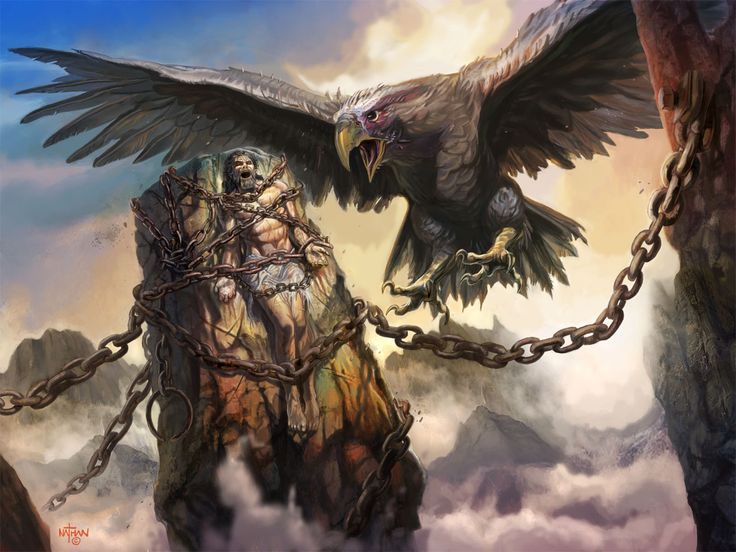THE CAUCASIAN EAGLE
The Punisher
The Caucasian Eagle is one of the mythical creatures to appear in the legendary tales of Ancient Greece. Gigantic in stature, the Caucasian Eagle is famous for its role in punishing the Titan Prometheus.
THE CAUCASIAN EAGLE
The eagle was an important symbol within Greek mythology, for it was the sacred creature of Zeus, and the supreme deity of the Greek mythology was known to transform into one, when he abducted Aegina for example, and also to make use of them, with eagles known to carry the god’s thunderbolts.
The Caucasian Eagle though was not a normal eagle, despite being used by Zeus, and the Caucasian Eagle had a specific name, Aetos Kaukasios; and many ancient sources, including the Theogony (Hesiod), the Bibilotheca (Pseudo-Apollodorus), Argonautica (Apollonius Rhodius), and Prometheus Bound (Aeschylus) make reference to the bird.
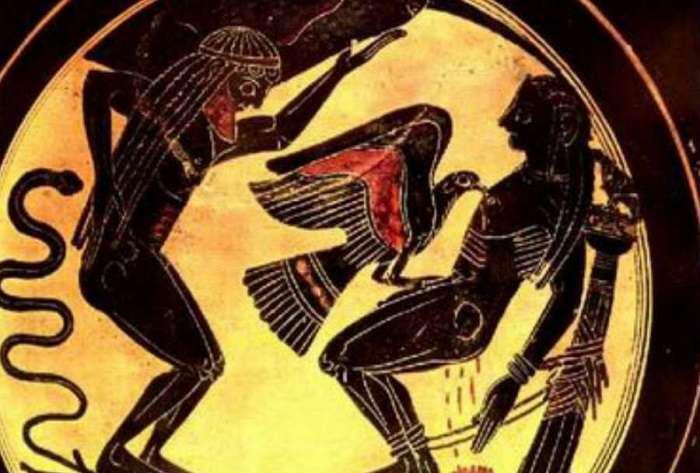
THE ORIGINS OF THE CAUCASIAN EAGLE
It was normally said that the Caucasian Eagle was one of the monstrous offspring of Typhon and Echidna, making the Caucasian Eagle sibling to the likes of the Nemean Lion and Lernaean Hydra.
Occasionally though, it was said that the Caucasian Eagle was a child of Tartarus and Gaia, making it a sibling to Typhon and Campe.
The Caucasian Eagle though was perhaps not as monstrous as the children born to Typhon and Echidna, and possibly Tartarus and Gaia, and so an alternative theory was put forth that the Caucasian Eagle was not a living beast, but was instead an automaton constructed by the metal-working god Hephaestus.
The Caucasian Eagle received its name because its range was in the Caucasus Mountains, just as the Nemean Lion was to be found in Nemea, and the Lernaean Hydra in Lerna.
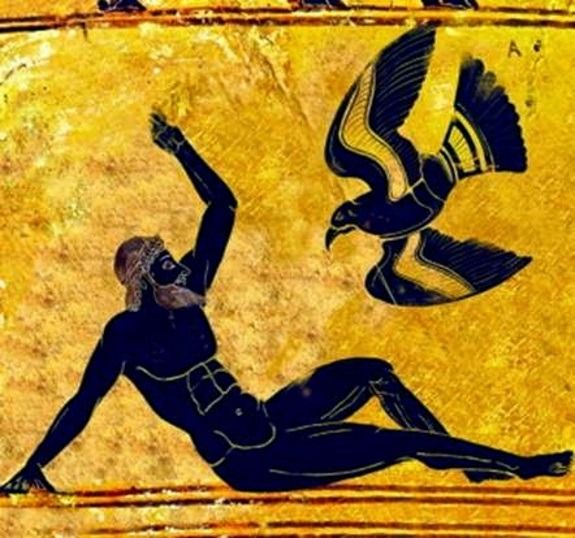
THE PUNISHMENT OF PROMETHEUS
The Caucasian Eagle comes to prominence in Greek mythology because of the role it played in the punishment of Prometheus, a punishment meted out to the Titan by Zeus.
Prometheus had been the benefactor of man following the Titanomachy, and having created mankind from clay, had imbued it with skills and abilities taken from the Olympian gods, before stealing the secret of fire from the workshop of Hephaestus.
Having then taught mankind how to get the best from the sacrifices made to the gods, the anger of Zeus overflowed, resulting in punishment for the Titan.
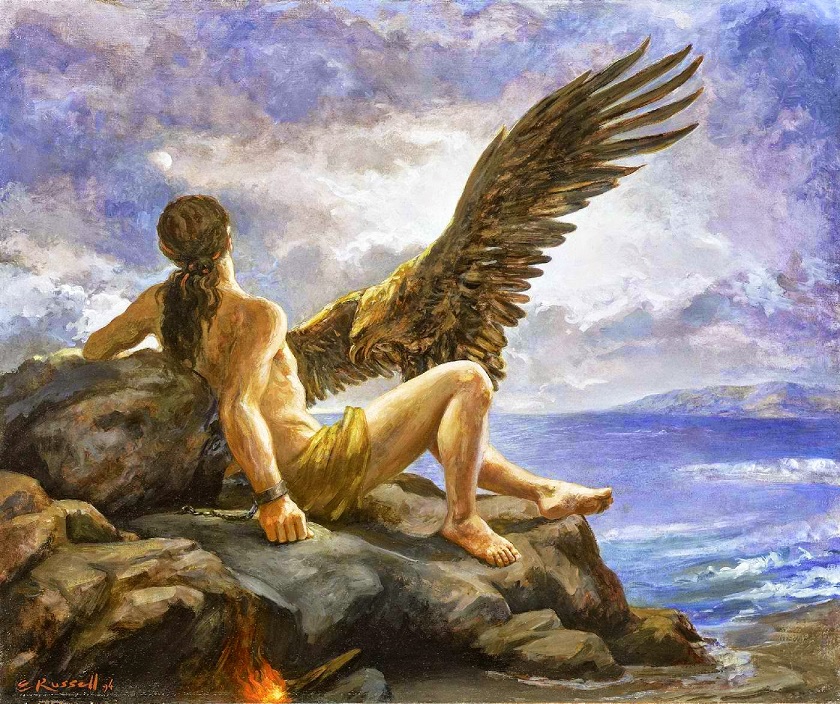
THE CAUCASIAN EAGLE AND PROMETHEUS
Prometheus was thus shackled to the unmovable Caucasus Mountains with unbreakable chains made by Hephaestus.
Then, for added torture, the Caucasian Eagle would feast on the liver of Prometheus each day; for the liver of the Titan would regenerate each night. Prometheus was of course immortal, and so did not die when his liver was plucked out, but would suffer perpetual pain because of the actions of the Caucasian Eagle.
The punishment of Prometheus went on for many years, and the Roman writer Hyginus, in Fabulae, put a timescale of 30,000 years on the daily feast of the Caucasian Eagle, which would indeed make the Caucasian Eagle extremely long lived.
No other writer was want to put a timescale upon the punishment of Prometheus, but it was said that Prometheus was bound prior to the Deluge, for he advised his son Deucalion what to do from his place of confinement, then Prometheus was seen by Io, and the cries of pain of the Titan were heard, and the Caucasian Eagle seen, by the Argonauts generations later.
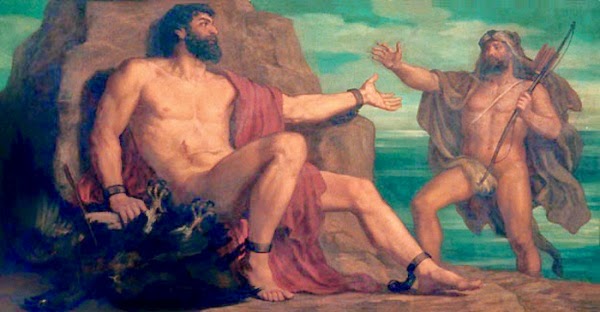
THE ROLE OF HERACLES
The punishment of Prometheus, and the life of the Caucasian Eagle, would come to an end through the intervention of the Greek hero Heracles.
In his life, Heracles had killed many monsters, but in the case of the Caucasian Eagle, Heracles did not blindly attack the bird, and, knowing that it was acting on the instructions of his father, Heracles sought permission from Zeus to bring the punishment of Prometheus to an end.
Some tell of Heracles offering Zeus the immortality of the centaur Chiron in exchange for the release of Prometheus, although it is not clear why Zeus would require the immortality of Chiron; but, in any case, whether a deal was brokered or not, Zeus agreed that Heracles could kill the Caucasian Eagle, and end the torment of Prometheus.
Zeus realised that the actions of Heracles would heighten his standing amongst men and gods alike; leading ultimately to the apotheosis of his favoured mortal son.
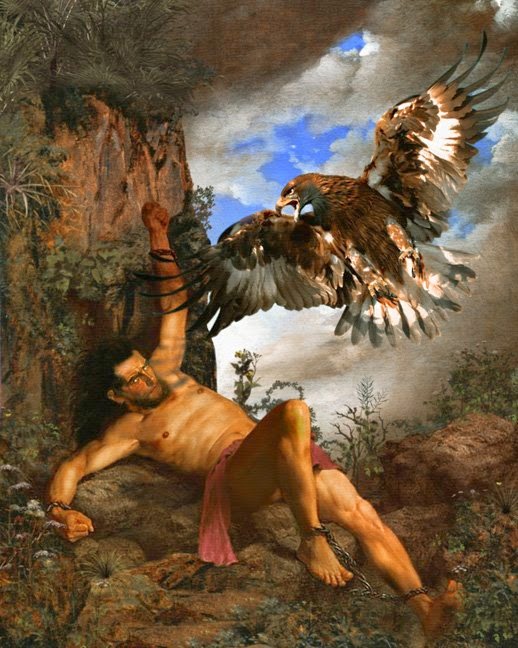
THE DEATH OF THE CAUCASIAN EAGLE
Thus, Heracles laid in wait in the Caucasus Mountains, biding his time until the gigantic Caucasian Eagle to fly overhead. Then, offering prayers up to Apollo for a straight flying projectile, Heracles unleashed a quiver fall of poison tipped arrows. Each arrow found its mark, and the Caucasian Eagle died mid-flight, crashing to the earth.
The combined strength of Prometheus and Heracles was then sufficient to break the Hephaestus crafted chains holding Prometheus in place.
Some tell of how Zeus would subsequently place the Caucasian Eagle amongst the stars as the constellation Aquila; although other eagles in Greek mythology were also named as the origin for this group of stars.
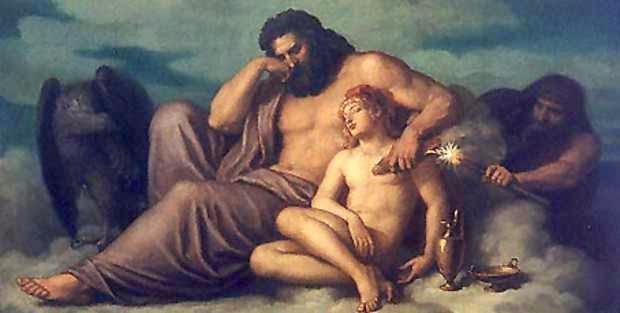
CLASSICAL LITERATURE QUOTES
Hesiod, Theogony 507 ff (trans. Evelyn-White) (Greek epic C8th or C7th B.C.) :
"Ready-witted Prometheus he [Zeus] bound with inextricable bonds, cruel chains, and drove a shaft through his middle, and set on him a long-winged eagle, which used to eat his immortal liver; but by night the liver grew as much again everyway as the long-winged bird devoured in the whole day. That bird Herakles (Heracles), the valiant son of shapely-ankled Alkmene (Alcmena), slew; and delivered the son of Iapetos from the cruel plague, and released him from his affliction--not without the will of Olympian Zeus who reigns on high, that the glory of Herakles the Theban-born might be yet greater than it was before over the plenteous earth."
Aeschylus, Prometheus Bound 115 ff (trans. Weir Smyth) (Greek tragedy C5th B.C.) :
"[Prometheus speaks after being chained to a crag in the Kaukasos (Caucasus) mountains :] ‘Ha! Behold! What murmur, what scent wings to me, its source invisible, heavenly or human, or both? . . . Ha! What's this? What may be this rustling stir of birds I hear again nearby? The air whirs with the light rush of wings. Whatever approaches causes me alarm [i.e. he thinks it is the sound of the Eagle which will be sent to feed on his liver].’"
Aeschylus, Prometheus Bound 1021 ff :
"[Hermes addresses Prometheus after his chaining :] ‘The winged hound of Zeus, the ravening eagle, coming an unbidden banqueter the whole day long, with savage appetite shall tear your body piecemeal into great rents and feast his fill upon your liver until it is black with gnawing.’"
Aeschylus, Prometheus Unbound (lost play) :
In Aeschylus' lost play Prometheus Unbound the Titan Prometheus is freed from his bonds by Herakles who slays the tormenting Eagle with an arrow.
Aeschylus, Fragment 107 Prometheus Unbound (from Cicero, Tusculan Disputations 2. 10. 23-25) (trans. Weir Smyth) (Greek tragedy C5th B.C.) :
"[Prometheus laments :] ‘Behold me fettered, clamped to these rough rocks . . . Thus hath Zeus, the son of Kronos (Cronus), fastened me, and to the will of Zeus hath Hephaistos (Hephaestus) lent his hand. With cruel art hath he riven my limbs by driving in these bolts. Ah, unhappy that I am! By his skill transfixed, I tenant this stronghold of the Erinyes (Furies). And now, each third woeful day, with dreadful swoop, the minister of Zeus with his hooked talons rends me asunder by his cruel repast. Then, crammed and glutted to the full on my fat liver, the utters a prodigious scream and, soaring aloft, with winged tail fawns upon my gore. But when my gnawed liver swells, renewed in growth, greedily doth he return anew to his fell repast. Thus do I feed this guardian of my awful torture, who mutilates me living with never-ending pain. For fettered, as ye see, by the bonds of Zeus, I have no power to drive from my vitals the accursed bird. Thus, robbed of self-defence, I endure woes fraught with torment : longing for death, I look around for an ending of my misery; but by the doom of Zeus I am thrust far from death. And this my ancient dolorous agony, intensified by the dreadful centuries, is fastened upon my body, from which there fall, melted by the blazing sun, drops that unceasingly pour upon the rocks of Kaukasos (Caucasus).’"
Aeschylus, Fragment 113 Prometheus Unbound (from Plutarch, On Love 14. 757E) :
"[Herakles prays as he takes aim with his bow against the eagle tormenting Prometheus :] ‘May Hunter Apollon speed my arrow straight!’"
Pseudo-Apollodorus, Bibliotheca 1. 45 (trans. Aldrich) (Greek mythographer C2nd A.D.) :
"He [Zeus] ordered Hephaistos (Hephaestus) to rivet the body of Prometheus to Mount Kaukasos (Caucasus), a Skythian (Scythian) mountain, where he was kept fastened and bound for many years. Each day an Eagle would fly to him and munch on the lobes of his liver, which would then grow back at night."
Pseudo-Apollodorus, Bibliotheca 2. 120 :
"When he [Herakles] reached the mainland on the other side he killed with an arrow the Eagle on the Kaukasos (Caucasus), the product of Ekhidna (Echidna) and Typhon that had been eating the liver of Prometheus."
Apollonius Rhodius, Argonautica 2. 1238 ff (trans. Rieu) (Greek epic C3rd B.C.) :
"And now the last recess of the Black Sea opened up and they [the Argonauts] caught sight of the high crags of the Kaukasos (Caucasus), where Prometheus stood chained by every limb to the hard rock with fetters of bronze, and fed an Eagle on his liver. The bird kept eagerly returning to its feed. They saw it in the afternoon flying high above the ship with a strident whirr. It was near the clouds, yet it made all their canvas quiver to its wings as it beat by. For its form was not that of an ordinary bird : the long quill-feathers of each wing rose and fell like a bank of polished oars. Soon after the Eagle had passed, they heard Prometheus shriek in agony as it pecked at his liver. The air rang with his screams till at length they saw the flesh-devouring bird fly back from the mountain by the same way as it came."
Apollonius Rhodius, Argonautica 3. 844 ff :
"It [a magical herb] first appeared in a plant that sprang from the blood-like ichor of Prometheus in his torment, which the flesh-eating Eagle had dropped on the spurs of Kaukasos (Caucasus)."
Callimachus, Fragment 551 (trans. Trypanis) (Greek poet C3rd B.C.) :
"And him [the Eagle] who devoured the liver of the protector of mankind [Prometheus]."
Diodorus Siculus, Library of History 4. 15. 2 (trans. Oldfather) (Greek historian C1st B.C.) :
"And Zeus, when Prometheus had taken fire and given it to men, put him in chains and set an eagle at his side which devoured his liver. But when Herakles saw him suffering such punishment because of the benefit which he had conferred upon men, he killed the eagle with an arrow."
Pausanias, Description of Greece 5. 11. 6 (trans. Jones) (Greek travelogue C2nd A.D.) :
" [Amongst the objects dedicated in the temple of Zeus at Olympia :] At Olympia there are screens constructed like walls which keep people out. Of these screens . . . parts show pictures by Panainos (Panaenus). Among them is . . . Prometheus still held by his chains, though Herakles has been raised up to him. For among the stories told about Herakles is one that he killed the eagle which tormented Prometheus in the Kaukasos (Caucasus), and set free Prometheus himself from his chains."
Quintus Smyrnaeus, Fall of Troy 5. 334 ff (trans. Way) (Greek epic C4th A.D.) :
"[Prometheus] endured all pangs he merited, when, deep-burrowing, the Eagle tare his liver aye renewed!"
Quintus Smyrnaeus, Fall of Troy 6. 269 ff :
"Herakles, rending Prometheos' (Prometheus') chains, and hurling them this way and that with fragments of the rock whereinto they were riveted, set free the mighty Titan. Arrow-smitten lay the Eagle of the Torment there beside."
Quintus Smyrnaeus, Fall of Troy 10. 190 ff :
"[Amongst the scenes depicted on the quiver of Herakles :] There was the Titan Iapetos' great son [Prometheus] hung from the beetling crag of Kaukasos (Caucasus) in bonds of adamant, and the Eagle tare his liver unconsumed--he seemed to groan!"
Pseudo-Hyginus, Fabulae 31 (trans. Grant) (Roman mythographer C2nd A.D.) :
"The shining Eagle which was eating out the heart of Prometheus he [Herakles] killed with his arrows."
Pseudo-Hyginus, Fabulae 54 :
"Hercules was sent to kill the Eagle which was eating out Prometheus' heart. When it was killed, Prometheus after thirty thousand years was freed from Mount Caucasus."
Pseudo-Hyginus, Fabulae 144 :
"Mercurius [Hermes], at Jove's [Zeus'] command, bound him [Prometheus] with iron spikes to a cliff on Mount Caucasus, and set an Eagle to eat out his heart; as much as it devoured in the day, so much grew again at night. After 30,000 years Hercules killed this eagle and freed Prometheus."
Pseudo-Hyginus, Astronomica 2. 15 :
"[Constellation] Arrow. This arrow, they say, is one of the weapons of Hercules, with which he is said to have killed the Eagle which ate the liver of Prometheus . . . Prometheus he [Zeus] bound with an iron chain to a mountain in Scythia named Caucasus for thirty thousand years, as Aeschylus, writer of tragedies, says. Then, too, he sent an Eagle to him to eat out his liver which was constantly renewed at night. Some have said that this eagle was born from Typhon and Echidna, other from Terra (Earth) [Gaia] and Tartarus, but many point out it was made by the hands of Vulcanus [Hephaistos (Hephaestus)] and given life by Jove [Zeus] . . . But to come back to the beginning of the inquiry and the death of the eagle. Hercules, when sent by Eurystheus for the apples of the Hesperides, out of ignorance of the way came to Prometheus, who was bound on Mount Caucasus, as we have shown above. When victor, he returned to Prometheus to tell him that that Draco (Dragon) we have mentioned was slain, and to thank him for his kindness since he had pointed out the way. Straightway he gave what honour he could to the one that deserved it, for he killed the eagle and since it was slain, men began, when victims were sacrificed, to offer livers on the altars of the gods to satisfy them in place of the liver of Prometheus."
Virgil, Georgics 6. 41 ff (trans. Fairclough) (Roman bucolic C1st B.C.) :
"Then he [the poet Orpheus] sings . . . of Caucasian eagles, and the theft of Prometheus.”
Propertius, Elegies 2. 1 (trans. Goold) (Roman elegy C1st B.C.) :
"Release Prometheus' arms from his crag on the Caucasus and drive the Vulture away from the middle of his breast."
Seneca, Hercules Furens 1206 ff (trans. Miller) (Roman tragedy C1st A.D.) :
"[Herakles, inflicted with madness, cries out :] ‘Let the Caspian crags claim my fettered body, and let the ravenous bird--Why are Prometheus' crags unoccupied? Why, the bare, steep side of Caucasus which, on its lofty summit, feeds beasts and birds of prey?’"
Valerius Flaccus, Argonautica 4. 60 ff (trans. Mozley) (Roman epic C1st A.D.) :
"From the crags and amidst the very ravening of the dreadful Vulture, Prometheus too himself besets Jove [Zeus] with groans and piteous pleas, uplifting eyes that the cruel frosts have seared; the rivers and rocks of Caucasus redouble the loud complaint; the Bird itself is amazed at the clamour of the god . . . He [Zeus] moved by the goddesses' [Artemis and Leto's] tears and Phoebus' [Apollon's] high renown sends down swift Iris on her rosy cloud. ‘Go,&esquo; he says, ‘let Alcides [Herakles] put off the Phrygians and the war of Troy [to which he was heading]. Now let him rescue the Titan from the dreadful Bird.’"
Valerius Flaccus, Argonautica 5. 155 ff :
"His [Herakles'] comrades [the Argonauts] proceed upon their way; only they wonder from the deep at the wide-flung snow that strews the beaches [i.e. that was cast from the Kaukasos (Caucasus) Mountains when Herakles freed Prometheus from his bonds], at the cloven crags and the huge shadow of a dying bird [the Eagle slain by Herakles] above them and the gory dew that drizzles through the air."
Valerius Flaccus, Argonautica 7. 352 ff :
"She [the witch Medea] girds up her robe and takes forth a Caucasian herb, of potency sure beyond all others, sprung of the gore that dropped from the liver of Prometheus, and grass wind-nurtured, fostered and strengthened by that blood divine among snows and grisly frosts, when the Vulture rises from his feasting on the flesh and from his open beak bedews the cliffs."
Sources
GREEK
Hesiod, Theogony - Greek Epic C8th - 7th B.C.
Aeschylus, Prometheus Bound - Greek Tragedy C5th B.C.
Aeschylus, Fragments - Greek Tragedy C5th B.C.
Apollodorus, The Library - Greek Mythography C2nd A.D.
Apollonius Rhodius, The Argonautica - Greek Epic C3rd B.C.
Callimachus, Fragments - Greek Poetry C3rd B.C.
Diodorus Siculus, The Library of History - Greek History C1st B.C.
Pausanias, Description of Greece - Greek Travelogue C2nd A.D.
Quintus Smyrnaeus, Fall of Troy - Greek Epic C4th A.D.
ROMAN
Hyginus, Fabulae - Latin Mythography C2nd A.D.
Hyginus, Astronomica - Latin Mythography C2nd A.D.
Virgil, Georgics - Latin Bucolic C1st B.C.
Propertius, Elegies - Latin Elegy C1st B.C.
Seneca, Hercules Furens - Latin Tragedy C1st A.D.
Valerius Flaccus, The Argonautica - Latin Epic C1st A.D.
"Greek Legends and Myths"
"Theoi"


